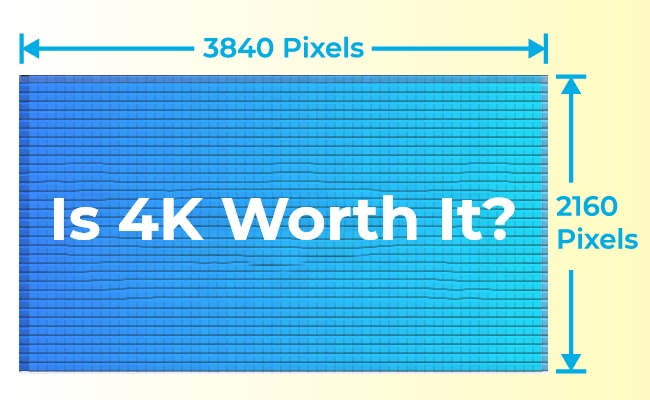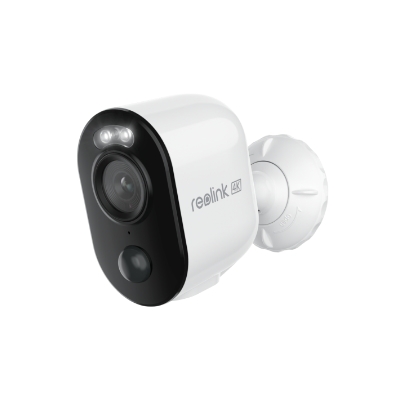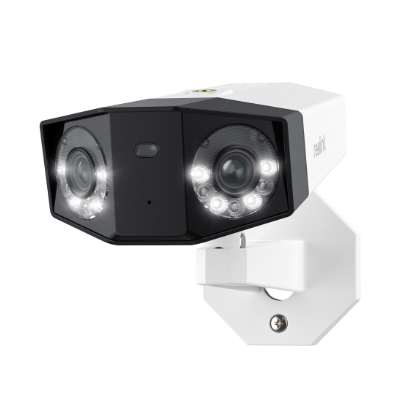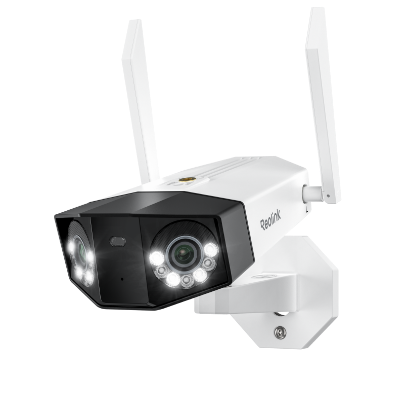Is 4K Worth It? All You Need to Know

In the present, continuously evolving world of digital technology, the debate over "Is 4K worth it?" continues to spark curiosity among people. As people now want to have a more immersive and visually captivating experience, therefore, the appeal of 4K resolution has become increasingly exciting for people.
However, if you are new to the concept or don't know much about 4K resolution, don't worry. Here, we will explore everything about 4K resolution and is 4K worth it.
What is 4K Resolution?
Regarding what 4K resolution is, you must know that 4K resolution refers to a display resolution with approximately 4000 horizontal pixels. The 4k resolution pixels provide unparalleled clarity, sharpness, and detail in images and videos.
4K resolution is also known as Ultra High Definition (UHD), which has now become a standard for new TVs.
The term "4K" is derived from the width of the resolution. However, now it has become the go-to standard for ultra-high-definition viewing across various devices and platforms. This resolution is four times more detailed than 1080p HD. Therefore, it offers a significant improvement in visual quality.
Benefits of 4K resolution
4K resolution offers multiple benefits. These benefits are here to offer enhanced gaming and viewing experience. However, let's get into the details of 4k resolution's benefits to know more.
Detail and sharpness
4K resolution offers exceptional detail and sharpness level. With approximately 4000 horizontal pixels, 4K resolution delivers a level of clarity and precision that significantly surpasses lower resolutions. It will ultimately let you have a more immersive and visually captivating experience.
Larger screen compatibility
4K resolution is well-suited for larger screens, offering the ability to create and view images on a scale that is way better than traditional TVs. The compatibility of 4K with larger screens allows for a more expansive viewing experience. That's why it is an ideal option for home entertainment and gaming setups.
HDR support
HDR support is another key benefit of 4K resolution. HDR technology enhances images' contrast and color accuracy, creating a more vibrant and lifelike visual experience. This feature is particularly valuable for gaming and home entertainment as it can increase overall visual content quality.
Improve view and gaming experience.
For both content consumption and gaming, 4K resolution can elevate the experience to a whole new level. It is here to offer a greater immersion and realism.
Devices Using: Is 4K worth it?
Is YouTube TV 4K worth it?
The rise of 4K content on streaming platforms has made 4K TVs popular for many consumers. However, is the upgrade to 4K worth it? Well, the answer to this is yes, especially for streaming content. Moreover, it offers additional channels that provide content in 4K resolution, such as Discovery, ESPN, FOX Sports, and FX.
YouTube TV's 4K package is compatible with various devices, including 4K smart TVs, streaming players, and gaming consoles.
Is a 4K security camera worth it?
4K security cameras can help improve surveillance with high-quality footage captured. 4K resolution offers even greater clarity and detail, especially for outdoor surveillance.
The Reolink Argus 3 Ultra, with its 4K resolution and advanced features such as color night vision and smart detection, is well-suited for comprehensive outdoor security needs. This 4K camera also delivers enhanced image quality with improved surveillance capabilities.
4K 8MP Standalone Wire-Free Camera
4K 8MP; Smart Detection; 5/2.4GHz Dual-Band WiFi; Battery/Solar Powered; Color Night Vision; Alerts Without Subscription.
Is a 4K monitor worth it for game?
Utilizing a 4K monitor for gaming, whether on PC or console, can greatly enhance the visual experience, but it may require a high-end CPU/GPU to leverage the resolution fully.
A powerful CPU is essential for handling the processing demands of a 4K resolution monitor. A multicore processor with a high clock speed is recommended. Examples of CPUs that can handle 4K resolution include the AMD Ryzen 7 series or Intel Core i7 series.
A GPU is crucial for rendering high-resolution graphics on a 4K monitor. You will need a graphics card with sufficient VRAM and processing power to handle the increased pixel count. Examples of GPUs suitable for 4K resolution may include the NVIDIA GeForce RTX 30 series.
A 4K monitor offers a higher resolution than a standard 1080p monitor, resulting in sharper and more detailed visuals. This can enhance the gaming experience, especially for games with intricate graphics and textures. Additionally, a 4K monitor typically has a larger screen size, which provides more screen real estate for gaming.
Above all, investing in a 4K monitor now ensures compatibility with future games and media that take advantage of higher resolutions. The latest gaming consoles, such as the Xbox Series X and PlayStation 5, support 4K resolution and can take full advantage of a 4K monitor. These consoles also support features like HDR and high refresh rates, which can further enhance the gaming experience on a 4K monitor.
Is 4K TV worth it?
Upgrading to a 4K TV can significantly improve the viewing experience. The fact is especially truer for larger screens. Even more, the availability of 4K content is increasing, with streaming platforms, gaming consoles, and Blu-ray discs offering content in 4K resolution. So, you can fully enjoy and appreciate the high-resolution content available with a 4K monitor.
Common 4K Devices Upgrading Problems
When considering the transition to 4K resolution, several common upgrading problems may arise. These upgrading problems can certainly impact both the user experience and the overall cost of adoption. However, some of the common 4K devices upgrading problems include:
Bandwidth and storage
4K resolution affects bandwidth and storage due to multiple reasons. For example, 4K resolution offers four times the number of pixels compared to 1080p HD video, resulting in larger file sizes. Higher video resolutions require more data to represent the increased level of detail, resulting in larger files that occupy more storage space.
Video streaming requires the transmission of data over the internet, and the resolution of the video directly affects the amount of data that needs to be transferred. Higher resolutions, like 4K, require more data to be transmitted, leading to increased bandwidth consumption. This can be a concern for both content creators and viewers, as it requires a stable and fast internet connection to stream high-resolution content without buffering or quality degradation.
Device compatibility
There are two different scenarios when it comes to device compatibility for 4k resolution. These are:
Older hardware limitations
Upgrading to 4K resolution may be affected by the limitations of older hardware, such as outdated graphics cards or processors, which need help to support the demands of 4K resolution content. It can result in compromised performance and compatibility issues. You will require additional investment in newer hardware to fully enjoy 4K resolution capabilities.
Compatibility issues with existing peripherals
Existing peripherals, such as monitors, may not be compatible with 4K resolution. Older monitors may not support 4K resolution due to hardware limitations. These monitors might have a maximum resolution of 1080p or lower. Connecting a 4K source to such monitors may result in a downscaled resolution.
It will purchase new peripherals that support 4K output necessary. Additionally, connectivity standards like USB may also require an upgrade to ensure seamless compatibility with 4K devices.
Cost
Above all, the transition to 4K resolution often entails significant costs. It usually includes the purchase of 4K-compatible devices, upgraded storage solutions, and potentially new peripherals. Additionally, the need for higher bandwidth internet connections to support 4K streaming can lead to increased subscription costs. Certainly, it will further impact the overall cost of upgrading to 4K resolution.
Overall, these common upgrading problems highlight the considerations and potential challenges associated with the 4K resolution adaption. Furthermore, these also emphasize the need for thorough assessment and planning to ensure a seamless transition to 4k resolution.
Is 16MP Worth It?
In addition to 4K resolution, security cameras have seen upgrades to even higher resolutions, such as 16MP. But is the jump to 16MP really worth it? Well, when it comes to image clarity and detail, opting for 16MP resolution definitely pays off. It provides nearly double the pixel count of 4K, enabling it to capture finer details with precision.
Reolink has also introduced its first 16MP model, the Duo 3 PoE. This innovative camera features a dual-lens design, delivering a total resolution of 7680x2160 pixels with 16 million individual pixel dots in a single frame. Moreover, it offers a wide 180-degree field of view, eliminating blind spots and ensuring comprehensive coverage against potential threats. Whether you need surveillance for your driveways, stores, or homes, this camera proves to be a powerful solution.
Groundbreaking 16MP Dual-Lens PoE Camera
16MP UHD, Dual-Lens, Motion Track, 180° Wide Viewing Angle, Power over Ethernet, Color Night Vision.
Reolink has extended its 16MP resolution technology to the Duo 3 WiFi, offering the same cutting-edge features with added wireless convenience. Like the Duo 3 PoE, this model boasts a dual-lens design that stitches images seamlessly into a 180-degree ultra-wide field of view, ensuring no blind spots remain in your surveillance coverage. Its 16MP resolution provides unparalleled clarity, making it easy to capture intricate details such as facial features, or small objects even from a distance.
Groundbreaking 16MP Dual-Lens WiFi Camera
16MP UHD, Dual-Lens, Motion Track, 180° Wide Viewing Angle, Plug-In WiFi, Color Night Vision.
FAQs
1. Is 4k worth it over 1440p?
4K resolution offers a higher pixel density and sharper image quality compared to 1440p. The difference between 4K and 1440p is significant, especially when viewing 4K resolution content on larger screens.
Ultimately, the worth of upgrading to 4K over 1440p depends on factors such as screen size, viewing distance, and the user's sensitivity.
2. Is 4K a noticeable difference?
The noticeable difference between 4K and lower resolutions, such as 1440p, depends upon multiple factors. These factors usually include the display size, the distance from which you are viewing 4K content and the individual's visual perception. It means the difference of 4K resolution is more noticeable on larger screens. This is because the increased pixel density of 4K can deliver a notably sharper and more detailed image.
However, the difference may be less pronounced on smaller screens or when viewed from a distance.
3. Do I really need a 4K TV?
The necessity of a 4K TV depends on individual preferences, viewing habits, and the content being consumed.
For those who prioritize high-resolution content, particularly for cinematic experiences or gaming, a 4K TV can offer enhanced visual fidelity and immersion. However, individuals with smaller screens or those who primarily consume content from a distance may find that the benefits of 4K resolution are less pronounced.
Conclusion
In conclusion, 4K resolution offers enhanced detail, sharpness, and compatibility with larger screens. However, it also requires you to consider different factors like bandwidth requirements, storage, device compatibility, and cost.
Overall, the decision of whether 4K technology is worth it depends on individual preferences, specific use cases, and available resources. For those who want improved clarity and a more immersive visual experience, 4K resolution is worth considering.
Search
Subscribe for the Latest Updates
Security insights & offers right into your inbox



